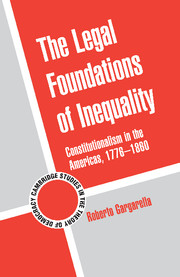4 - The Quest for Equality
Published online by Cambridge University Press: 06 July 2010
Summary
Ulysses' Disloyalty
The constitutional models adopted in most American countries, I believe, dishonored the egalitarian ideals that were present at the beginning of the revolutions of independence. Most people became engaged in, or enthusiastic about, those independence struggles because of the egalitarian promises associated with the revolutionary movements. They believed in the importance of collective self-government and wanted to prevent foreign societies from deciding how locals should live and how they should organize their political institutions. They believed that all the members of society had to have an equal and decisive say in the collective affairs of their community. They believed in the value of personal equality, in the idea that all men are created equal and that all are endowed with a “moral sense,” as Jefferson put it. They assumed that all had the same inalienable rights, an idea that they first learned from the French revolutionaries and which was pushed forward by their political leaders. As Wood claims, “The Revolution shattered traditional structures of authority, and common people increasingly discovered that they no longer had to accept the old distinctions that had separated them from the upper ranks of the gentry. Ordinary farmers, tradesmen, and artisans began to think they were as good as any gentleman and that they actually counted for something in the movements of events. Not only were the people being equated with God, but half-literate plowmen were being told even by aristocrats like Thomas Jefferson that they had as much common or moral sense as learned professors.”
- Type
- Chapter
- Information
- The Legal Foundations of InequalityConstitutionalism in the Americas, 1776–1860, pp. 215 - 248Publisher: Cambridge University PressPrint publication year: 2010

